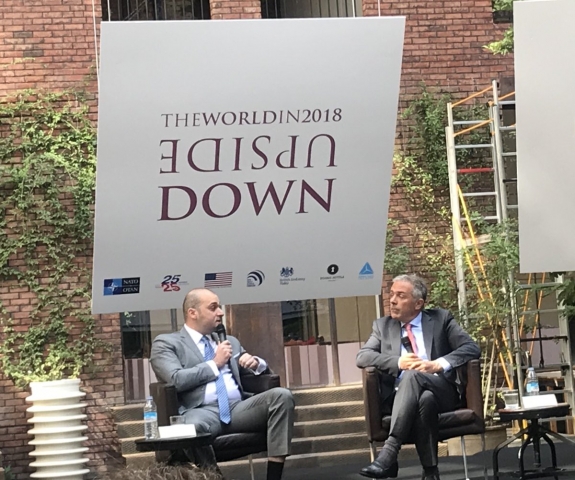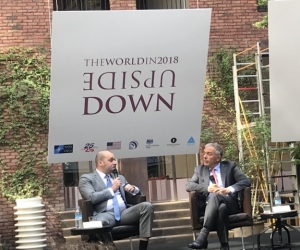The Man Who Asked the Question: Edward Luce on Georgian Democracy
EXCLUSIVE INTERVIEW
It’s not often that you see the Prime Minister of a sovereign country asked the question “Who is your boss?” yet that’s exactly what Financial Times’ Edward Luce did when he rather nonchalantly quizzed Georgian Prime Minister Mamuka Bakhtadze about the perceived “powers that be” behind the scenes. Luce’s conversation with PM Bakhtadze came during the opening session of the two-day conference that the McCain Institute for International Leadership at Arizona State University and the Economic Policy Research Center (EPRC) co-hosted in Tbilisi on September 11-12. Intriguingly titled “World in 2018: Upside Down?” the event boasted excellent speakers, great debates and packed attendance by the highest level representatives from Georgia’s political elite and diplomatic corps. Mr. Luce, whose inquisitive and downright skeptical questions (helped by the increasingly flustered PM) turned him into a local media sensation, was kind enough to sit down with GEORGIA TODAY and discuss his reasonable doubts about the state of democracy in Georgia.
The questions you posed to the PM turned you into a local media star. The questions leaned towards skepticism. What was this skepticism based on?
I'm not an expert on Georgia; this is actually my first visit to this beautiful city, but I've talked to a lot of Georgians and tried to read up on the country. Just the very fact that the ruling Georgian Dream party was founded by the richest person in the country and is essentially accountable to that person is an extraordinary fact. His assets are about a third of Georgia's national income and that is also extraordinary; it's very difficult for a democracy to be democratic in the real sense of the term when you have a single rich person holding that much power.
What would you propose as leverage against it? Strip him of his assets here?
I think there's a lot of confusion because I've been asking around, I even asked the President. There's a lot of gray area about where Bidzina Ivanishvili’s assets come from, whether he still has assets in Russia, what his relationship is or is not with Vladimir Putin and other Russian figures, and there’s a lack of transparency about the sources and the breakdown of his wealth because clearly most of it is not here. As such, it would be difficult to expropriate or tax his resources if they're not in the country. I think the more radical approach would be to demand transparency, complete, public accounting for where his wealth is, how much it's worth, where his assets are and so on.
If he made it transparent, would you and his like-minded critics change your minds about the allegations that he misuses his power by pulling the strings behind the scenes? Transparency is all that’s needed?
No. You could imagine Mark Zuckerberg running for President of America and all his assets are transparent, but he has extraordinary control over the means and levers. I don’t think it would be a level playing field, and democracy requires free and fair elections in the real sense of free and fair. If one person can buy a whole party and if that party thinks its accountable not to the people but to that one person, that's a real problem for democracy.
You asked the PM who his boss was. What gave you the impression that the country’s foremost political figure is somebody else’s subordinate?
All the Georgians that I spoke to gave me that impression, so I really channeled my question from what my Georgian friends had said to me, and I'm talking about a lot of people from different walks of life in Georgia, from the media, from politics- both ruling party members and opposition. This struck me as a pretty universal question to which it appeared everybody actually knows the answer.
What other troubling subjects did your Georgian friends underline in discussions with you? What is your impression?
I'm here at the invitation of the McCain Institute. The recent death of Senator John McCain underlines that what ails Georgia, and many democracies around the world, is that the idea of the West and the West supporting smaller plucky independent countries like Georgia has been declining, and that's a real problem for everybody. People from the West who come and criticize Georgia's democracy, and I guess that would include me, should realize that people who live in glass houses shouldn’t throw stones because we're all having democratic problems, we're all under oligarchs in some form. There’s a deeper philosophical challenge to the future of liberal democracy around the world. I don't know Georgia very well, but I fell in love with this country and I would like to get to know it better. it's a beautiful country and it's a very important small country and I really hope that democracy thrives and succeeds here.
Interview by Vazha Tavberidze












